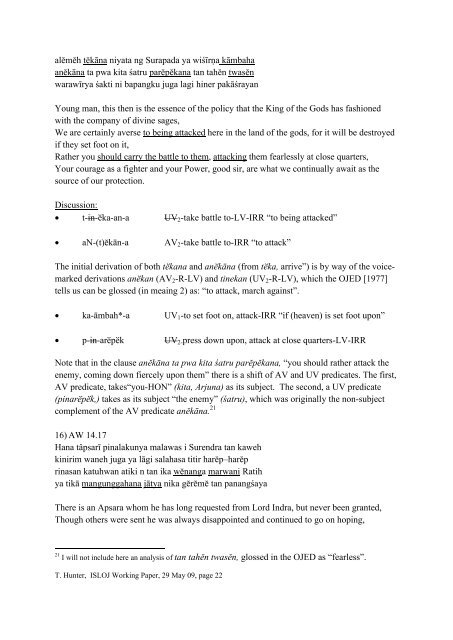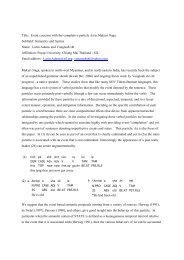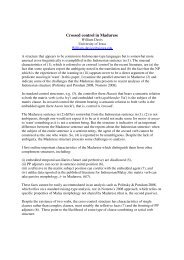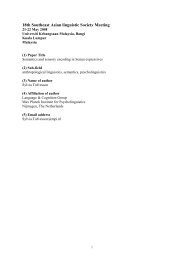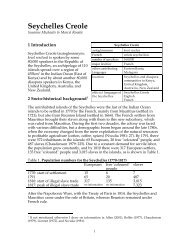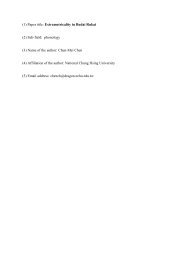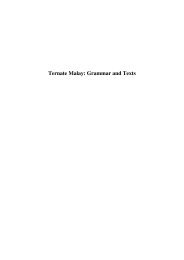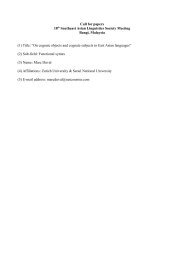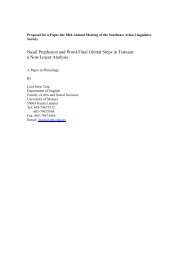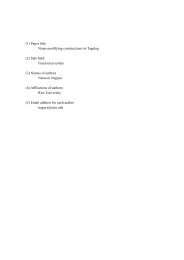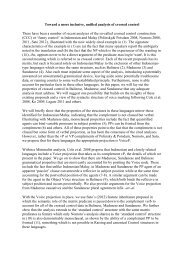Working Paper on Irrealis, Imperative Mode and Complementation ...
Working Paper on Irrealis, Imperative Mode and Complementation ...
Working Paper on Irrealis, Imperative Mode and Complementation ...
Create successful ePaper yourself
Turn your PDF publications into a flip-book with our unique Google optimized e-Paper software.
alĕmĕh tĕkāna niyata ng Surapada ya wiśīrṇa kāmbaha<br />
anĕkāna ta pwa kita śatru parĕpĕkana tan tahĕn twasĕn<br />
warawīrya śakti ni bapangku juga lagi hiner pakāśrayan<br />
Young man, this then is the essence of the policy that the King of the Gods has fashi<strong>on</strong>ed<br />
with the company of divine sages,<br />
We are certainly averse to being attacked here in the l<strong>and</strong> of the gods, for it will be destroyed<br />
if they set foot <strong>on</strong> it,<br />
Rather you should carry the battle to them, attacking them fearlessly at close quarters,<br />
Your courage as a fighter <strong>and</strong> your Power, good sir, are what we c<strong>on</strong>tinually await as the<br />
source of our protecti<strong>on</strong>.<br />
Discussi<strong>on</strong>:<br />
t-in-ӗka-an-a UV2-take battle to-LV-IRR “to being attacked”<br />
aN-(t)ĕkān-a AV2-take battle to-IRR “to attack”<br />
The initial derivati<strong>on</strong> of both tӗkana <strong>and</strong> anӗkāna (from tӗka, arrive”) is by way of the voicemarked<br />
derivati<strong>on</strong>s anӗkan (AV2-R-LV) <strong>and</strong> tinekan (UV2-R-LV), which the OJED [1977]<br />
tells us can be glossed (in meaing 2) as: “to attack, march against”.<br />
ka-āmbah*-a UV1-to set foot <strong>on</strong>, attack-IRR “if (heaven) is set foot up<strong>on</strong>”<br />
p-in-arӗpӗk UV2-press down up<strong>on</strong>, attack at close quarters-LV-IRR<br />
Note that in the clause anĕkāna ta pwa kita śatru parĕpĕkana, “you should rather attack the<br />
enemy, coming down fiercely up<strong>on</strong> them” there is a shift of AV <strong>and</strong> UV predicates. The first,<br />
AV predicate, takes“you-HON” (kita, Arjuna) as its subject. The sec<strong>on</strong>d, a UV predicate<br />
(pinarӗpӗk,) takes as its subject “the enemy” (śatru), which was originally the n<strong>on</strong>-subject<br />
complement of the AV predicate anĕkāna. 21<br />
16) AW 14.17<br />
Hana tâpsarī pinalakunya malawas i Surendra tan kaweh<br />
kinirim waneh juga ya lāgi salahasa titir harĕp‒harĕp<br />
rinasan katuhwan atiki n tan ika wĕnanga marwani Ratih<br />
ya tikā mangunggahana jātya nika gĕrĕmĕ tan panangśaya<br />
There is an Apsara whom he has l<strong>on</strong>g requested from Lord Indra, but never been granted,<br />
Though others were sent he was always disappointed <strong>and</strong> c<strong>on</strong>tinued to go <strong>on</strong> hoping,<br />
21 I will not include here an analysis of tan tahĕn twasĕn, glossed in the OJED as “fearless”.<br />
T. Hunter, ISLOJ <str<strong>on</strong>g>Working</str<strong>on</strong>g> <str<strong>on</strong>g>Paper</str<strong>on</strong>g>, 29 May 09, page 22


